Add this eBook to your basket to receive access to all 142 records. Our indexes include entries for the spelling luther. In the period you have requested, we have the following 142 records (displaying 21 to 30): These sample scans are from the original record. You will get scans of the full pages or articles where the surname you searched for has been found. Your web browser may prevent the sample windows from opening; in this case please change your browser settings to allow pop-up windows from this site. Treasury and Customs Records
(1685-1688)
Government accounts, with details of income and expenditure in Britain, America and the colonies
| Sample scan, click to enlarge
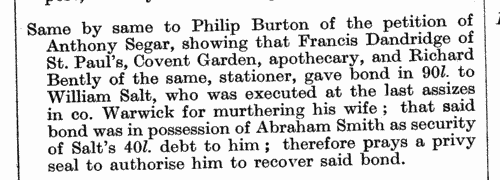
| Allegations for marriages in southern England
(1687-1694)
The province or archbishopric of Canterbury covered all England and Wales except for the northern counties in the four dioceses of the archbishopric of York (York, Durham, Chester and Carlisle). Marriage licences were generally issued by the local dioceses, but above them was the jurisdiction of the archbishop, exercised through his vicar-general. Where the prospective bride and groom were from different dioceses it would be expected that they obtain a licence from the archbishop; in practice, the archbishop residing at Lambeth, and the actual offices of the province being in London, which was itself split into myriad ecclesiastical jurisdictions, and spilled into adjoining dioceses, this facility was particularly resorted to by couples from London and the home counties, although there are quite a few entries referring to parties from further afield. The abstracts of the allegations given here usually state name, address (street in London, or parish), age, and condition of bride and groom; and sometimes the name, address and occupation of the friend or relative filing the allegation. Where parental consent was necessary, a mother's or father's name may be given. The ages shown should be treated with caution; ages above 21 tended to be reduced, doubtless for cosmetic reasons; ages under 21 tended to be increased, particularly to avoid requiring parental consent; a simple statement 'aged 21' may merely mean 'of full age' and indicate any age from 21 upwards. These are merely allegations to obtain licences; although nearly all will have resulted in the issuing of the licence, many licences did not then result in marriage. | Sample scan, click to enlarge

| Official Papers
(1694-1695)
The State Papers Domestic cover all manner of business relating to Britain, Ireland and the colonies, conducted in the office of the Secretary of State as well as other miscellaneous records. Here we have the period from January 1694 to June 1695.
| Sample scan, click to enlarge

| Hertfordshire Sessions
(1581-1700)
Incidents from the Hertfordshire Sessions Rolls. These cover a wide range of criminal and civil business for the county, with presentments, petitions, and recognizances to appear as witnesses: many of the records concern the county authorities dealing with regulation of alehouses, religious conventicles, absence from church, highways, poaching, profanation of the Sabbath, exercising trades without due apprenticeship &c. Unlike the Sessions Books, the decisions of the justices are not recorded on the rolls, which serve more as a record of evidence and allegations. Where the date of a roll is given with an asterisk, it indicates that that particular document was not then in the county muniments, but in the archives of the Marquess of Salisbury (whose ancestors had served as Custos Rotulorum) at Hatfield House. This is a calendar of abstracts of extracts: it is by no means a completely comprehensive record of the surviving Hertfordshire sessions rolls of the period, but coverage is good. | Sample scan, click to enlarge

| Treasury Books
(1699-1700)
Records of the Treasury administration in Britain and the colonies, from August 1699 to September 1700. These include records of the appointment and replacement of customs officers such as tide waiters and surveyors. The calendar was prepared by William A. Shaw for the Lords Commissioners of His Majesty's Treasury and published in 1933, from Treasury Minute Books xi and xii (T29/11-12); King's Warrant Book xx (T52/20); Money Books xiv and xv (T53/14-15); Order Book v (T60/5); Disposition Book xv (T61/15); Out Letters (General) xvi (T27/16); Out Letters (Customs) xiv (T11/14); Reference Book vii (Index 4621); Warrants not Relating to Money xvi (T54/16); Out Letters (Ireland) vii and viii (T14/7-8); Caveat Book i (T64/40); and Out Letters (Plantations Auditor) ii (T64/89).
| Sample scan, click to enlarge
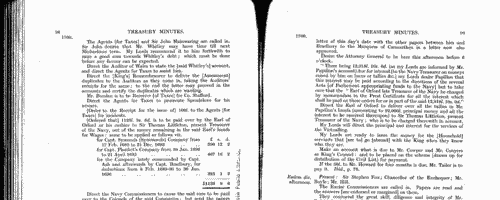
| Treasury Books
(1700-1701)
Records of the Treasury administration in Britain, America and the colonies, from October 1700 to December 1701.
| Sample scan, click to enlarge
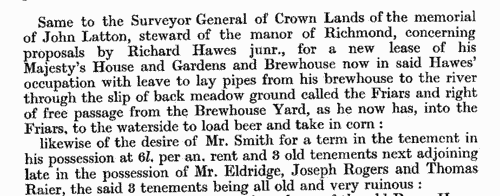
| Official Papers
(1700-1702)
The State Papers Domestic cover all manner of business relating to Britain, Ireland and the colonies, conducted in the office of the Secretary of State as well as other miscellaneous records. Includes lists of passes to travel abroad. This abstract covers the period from 1 April 1700 to 4 March 1702, with an appendix of items dating back as early as 1689.
| Sample scan, click to enlarge

| State Papers Domestic
(1702-1703)
The State Papers Domestic cover all manner of business relating to Britain, Ireland and the colonies, conducted in the office of the Secretary of State, as well as other miscellaneous records. 1 March 1702 to 31 May 1703. The calendar was prepared by Robert Pentland Mahaffy, with certain classes of document extracted and placed in separate appendices (called Tables): I, caveats; II, church and university appointments, &c.; III, commissions, warrants for commissions, notes of commissions and notes of warrants for commissions in the English army for 1702; IV, lord lieutenants and deputy lieutenants; V, Irish warrants; VI, weekly lists of ships of the Home Fleet with their stations and orders; VII, passes, notes of passes, post warrants and licences of absence; VIII, orders on petitions; IX, Scottish warrants and commissions; and X, miscellaneous royal warrants (to the Attorney or Solicitor General; in criminal cases; diplomatic; military warrants; miscellaneous warrants; secretary's warrants, allowance of bills, &c.; and notes of warrants for the appointment of almsmen). The source material in the Public Record Office that he drew on in making this compilation is referenced throughout, and is from the State Papers Domestic (and Military, Naval, Signet Office, Various, and Letter Books and Entry Books), State Papers Scotland (Correspondence, Letter Books and Warrants), State Papers Ireland (and King's Letter Books), and State Papers Channel Islands.
| Sample scan, click to enlarge
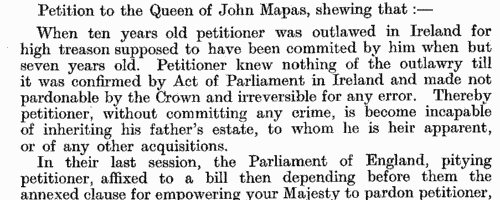
| House of Lords Proceedings
(1702-1704)
Private bills dealing with divorce, disputed and entailed estates: petitions, reports and commissions: naturalisation proceedings.
| Sample scan, click to enlarge
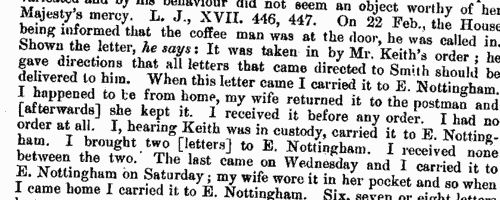
| Correspondence and Journal of Charles Talbot
(1674-1708)
Charles Talbot, earl and duke of Shrewsbury, served as Secretary of State, and this material includes his correspondence in that capacity from 1694 to 1700. He then proceeded on an extended tour of the Continent, from 1700 to 1706, of which he kept this journal. The collection also includes much personal correspondence, and some papers relating to the colonies in America and the West Indies. | Sample scan, click to enlarge

|
Research your ancestry, family history, genealogy and one-name study by direct access to original records and archives indexed by surname.
|











